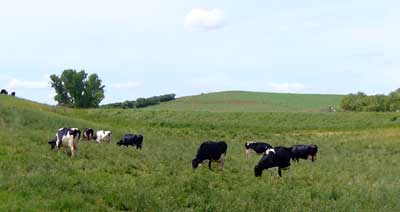Bovine Serum Albumin (BSA)
Bovine serum albumin is a large protein found in milk. It comprises about 2-5% of whey protein. This protein has a high concentration of sulphur amino acids and glutamylcycsteine, both of which are precursors for glutathione (Bounous 2000). Glutathione is a super antioxidant made in the body. It has the ability to recycle other antioxidants so that they can be reused by the body. Glutathione is so important that low glutathione concentrations are an indicator of illness (Kharb et al. 2000).
Bovine serum albumin binds long chain fatty acids and makes them water soluble (Walzem et al. 2002). 
Picture: A peaceful herd of dairy cows grazing on pasture.
BSA may inhibit cancer
Bovine serum albumin inhibits tumor growth. BSA inhibited an estrogen responsive breast cancer cell line, MCF-7, in vitro cell culture (Laursen et al. 1990). The cancer growth was inhibited in a concentration-dependant fashion (the more BSA that was added, the less the cancer cells grew). A recent study found that ribosylation of BSA resulted in reactive oxygen species (ROS) accumulation which killed breast cancer cells (Khan et al. 2013).
BSA may protect mammalian cells against certain genotoxic agents (Bosselaers et al. 1994). Genotoxic agents are mutagenic chemicals that damage cell DNA. This can result in mutations or cancers.
Other Uses for BSA
Bovine serum albumin is best known for it's use in the laboratory.
Bovine serum albumin is used in biochemistry in scientific assays such as the Enzyme-linked Immunosorbent Assay (ELISA to her friends). The ELISA is used to detect antibodies or antigens in samples. It is used to diagnose illnesses such as AIDS, malaria or tuberculosis. In immunohistochemistry BSA is used to study how cancerous tumors behave and grow. In cell culture, BSA is used in cell culture mediums as a supplement to feed cells and support cell growth. It is an important ingredient in 'cell sport's drinks' because it promotes cell growth, health and longevity. Bovine serum albumin carries nutrients to cells and binds free radicals and toxins to reduce cell damage. It also binds hormones and growth factors in order to act as a buffer and keep them stable.
References:
Bosselaers IM, Caessens PR, Van Boekel MS, Alink GM. Differential effects of milk proteins, BSA and soy protein on 4NQO- or MNNG-induced SCEs in V79 cells. Food Chemistry and Toxicology, 1994;32:905–911. Pubmed. Bounous, G. Whey protein concentrate (WPC) and glutathione modulation in cancer treatment. Anticancer Research. 2000;20:4785-4792. Pubmed. Kharb S, Singh V, Ghalaut PS, Sharma A, Singh GP. Glutathione levels in health and sickness. Indian J Med Sci. 2000;54:52-4. Pubmed. Full paper. Khan MS, Dwivedi S, Priyadarshini M, Tabrez S, Siddiqui MA, Jagirdar H, Al-Senaidy AM, Al-Khedhairy AA, Musarrat J. Ribosylation of bovine serum albumin induces ROS accumulation and cell death in cancer line (MCF-7). Eur Biophys J. 2013;42:811-8. Pubmed. doi: 10.1007/s00249-013-0929-6 Laursen I, Briand P, Lykkesfeldt AE. Serum albumin as a modulator of the human breast cancer cell line MCF-7. Anticancer Research, 1990;10:343–352. Pubmed. Walzem RL., Dillard CJ, German JB. Whey components: Millenia of evolution create functionalities for mammalian nutrition: what we know and what we may be overlooking. Critical Reviews in Food Science and Nutrition, 2002;42:353–375. Pubmed.
